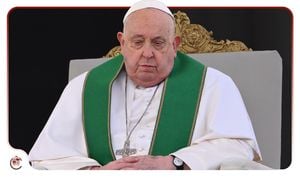CBS News has agreed to release the complete transcript of former Vice President Kamala Harris’s interview with "60 Minutes" to the Federal Communications Commission (FCC), as announced on Friday. This decision follows the FCC's request for the unedited transcript and camera feeds from the segment, which aired before Harris’s loss to President Trump during the 2024 elections.
"We are working to comply with this inquiry as we are legally compelled to do," CBS stated. The FCC's demand stems from a complaint filed by a conservative law firm last year. The firm accused CBS of engaging in what it termed "significant and intentional news distortion" during the interview, claims which were initially dismissed under the Biden administration but have since been reopened by agency head Brendan Carr, who was appointed by Trump.
The FCC is currently reviewing multiple complaints against major broadcasters, including CBS, ABC News, NBC News, and Fox Corporation. This scrutiny heightened after former Chair Jessica Rosenworcel dropped similar investigations last week, citing First Amendment protections.
Not only is CBS facing inquiries from the FCC, but President Trump has also taken legal action against the network. Trump filed a lawsuit with the U.S. District Court for the Northern District of Texas, seeking $10 billion as damages for what he claims are "partisan and unlawful acts of election and voter interference" related to the "60 Minutes" interview. Trump’s lawsuit echoes allegations of extensive editing which he argues misrepresents Harris’s responses.
The complaint, filed shortly before Trump’s electoral victory, emphasizes his accusation of CBS engaging in deceptive practices aimed at manipulating public perception. This situation escalated when CBS opted to withhold the full transcript following Trump’s demands, citing First Amendment grounds—a stance they upheld after the interview skirted controversy during the campaign.
According to reports, settlement discussions are currently on the table between Trump and CBS’s parent company, Paramount. While details remain unclear, sources within The New York Times suggest there is "no assurance" of reaching any agreement. Paramount's executives reportedly believe settling with Trump could facilitate smoother navigation of their planned multibillion-dollar merger with Skydance Media.
Ed Paltzik, Trump’s attorney, has emphasized the importance of accountability for media organizations. "President Donald J. Trump is dedicated to holding those who propagate deception and fake news accountable. CBS and Paramount intentionally misled the American public by unlawfully distorting their interview of Kamala Harris, all for the sake of increasing viewership amid her failing campaign," he stated.
Trump's lawsuit reflects his legal team’s assertion of CBS’s deceptive conduct during the interview. Accusations indicate CBS produced the interview with significant edits, which some allege aimed to obscure the nuances of Harris’s responses. Trump asserts the network modified her answer to make it appear more concise and direct than the original, extended response she provided during promotional clips.
These developments have drawn criticism from democratic FCC commissioner Anna Gomez, who conveyed her displeasure about recent inquiries against broadcasters. Gomez characterized the inquiry as "retaliatory moves by the government against networks perceived to produce unfavorable content." She noted, "This is meant to instill fear within broadcasters and influence editorial decisions."
CBS representatives have not provided additional comments on these matters when approached for clarification. The processing of such inquiries, lawsuits, and potential settlements highlight the current tension between media companies and governmental oversight, especially concerning politically charged subjects.
The situation remains fluid as CBS prepares to turn over the requested materials. The outcome of Trump's lawsuit and the FCC’s investigations could establish significant precedents affecting how news organizations operate, especially during politically sensitive periods.



